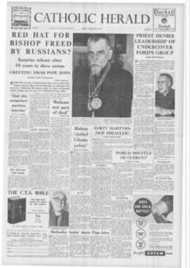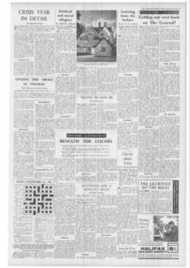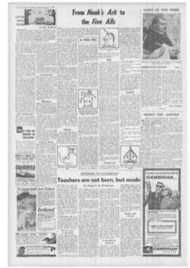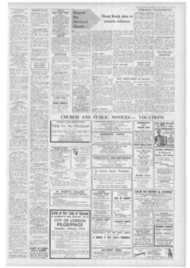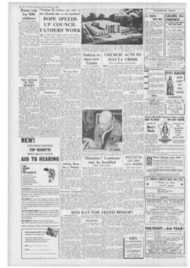Page 3, 15th February 1963
Page 3

Report an error
Noticed an error on this page?If you've noticed an error in this article please click here to report it.
Tags
Share
Related articles
Philosophy
Philosophy
The Blessed Sacrament
St Thomas Aquinas On Mortal And Venial Sin
How Thomas Aquinas Dealt With Bishops
FINDING OUT ABOUT ST. THOMAS
By Fr. Brocard Sewell, 0. Carm.
Introduction To Thomas Aquinas, by Josef Pieper (Faber, 21s.).
THE best work of this kind in English is still, it seems to me, Fr. Gerald Vann's St. Thomas Aquinas. Chesterton's book holds its own, but is as much an introduction to G.K.C. as to St. 1 homas. and most of us, perhaps, prefer to meet one person at a time.
Ficper's book should be at least as popular as these two; it is as ,e]) and intelligent as one could wish, but it makes rather heavier demands on the reader than does Fr. Vann's, and it suffers from being a translation, though a good oar.
Opening with an assessment of
the "situation" into which Aquinas was born, the author usefully points out that the Christianity of the 13th century "had been drastically reminded of how small a body it was within a vast non-Christian world. It was learning its own limitations in the most forceful way. and those limits were not only territorial." This is very much our situation today, and to realise it is to realise also the relevance of St. Thomas.
University
Dr. Pieper writes vividly of the ideal of the medieval university, and its life: and he is especially good in his analysis of St. -I homass method of teaching, noting the affinities between the scholastic orticulus and the Platonic dialogue. St. Thomas's respect for the personality and teachings of his opponents are compared with Newman's: "I have so great a respect both for the character and ability of Locke. for his manly simplicity of mind and his outspoken candour . . . that I feel no pleasure in considering him in the light of an opponent . . ." (Grammar of Assent).
Resemblances of method with von Hfigel are noted: "theology, for the sake of its own health, needs the resistance of science and phi:osophy." (De Chardin also, not mentioned by Pieper. fits well into this tine of thought).
The translation has not been checked in respect of English Catholic usage (who would speak of "a fest've divine service"?). and
the speling, strange] y. is American A bigger fault is the lazy relegation of the footnotes to an appendix But such blemishes are minor. This hook is an excellent one. and does what it sets out to do admirably.
blog comments powered by Disqus


